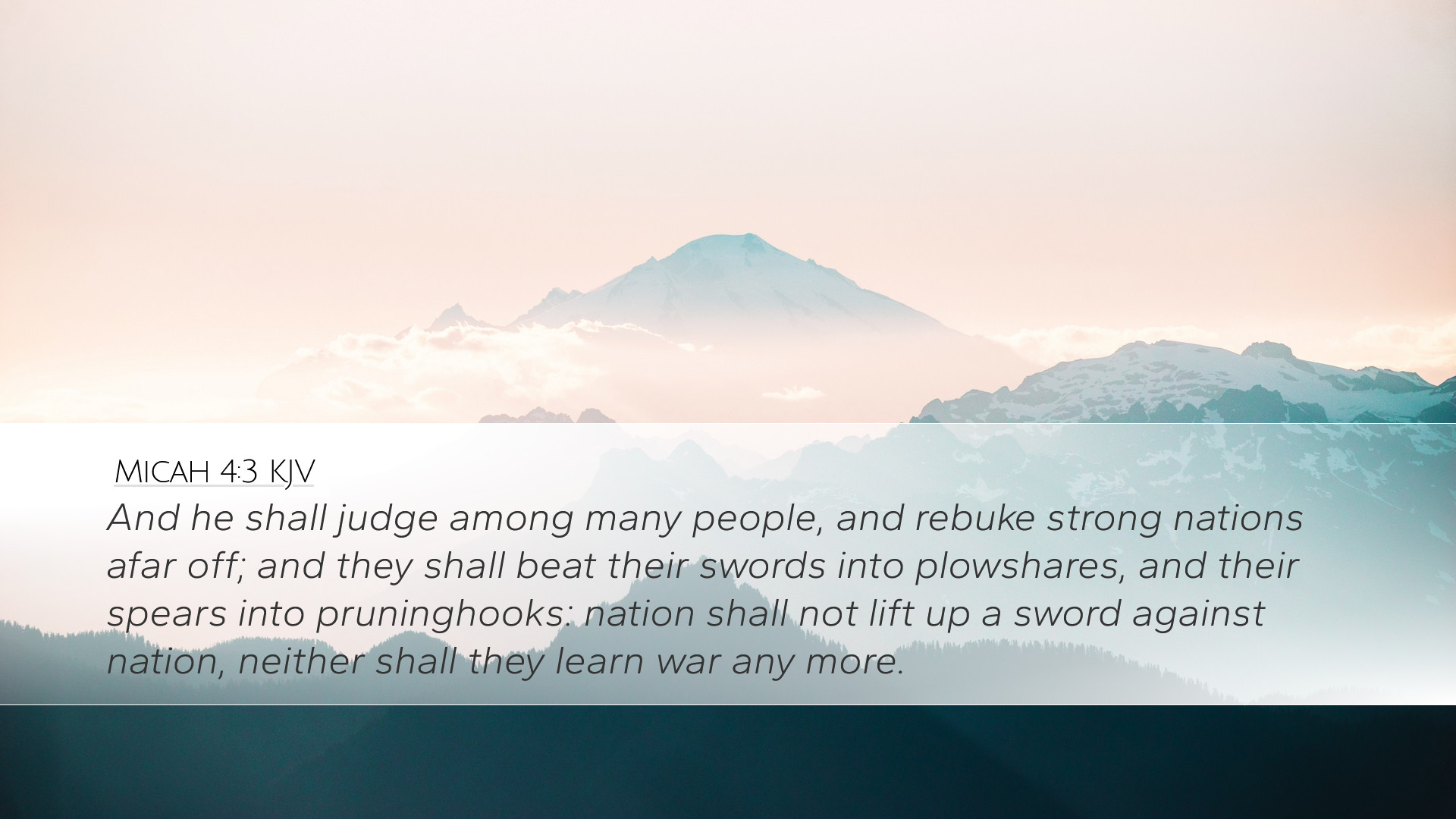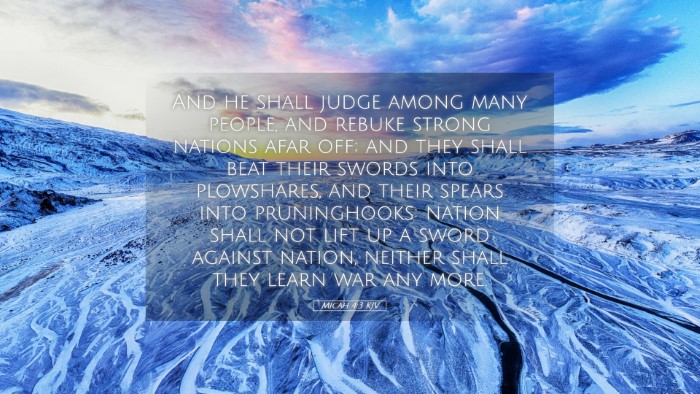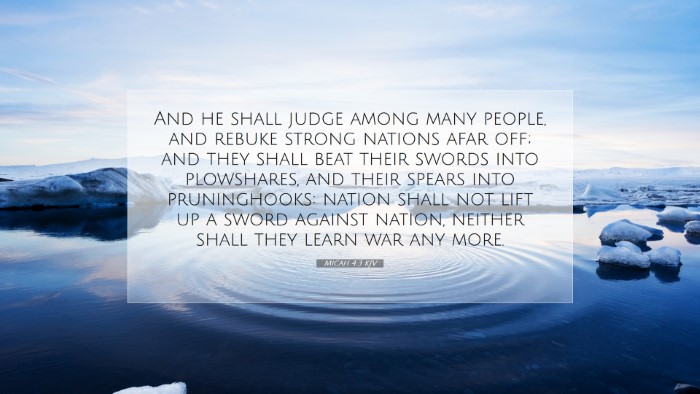Old Testament
Genesis Exodus Leviticus Numbers Deuteronomy Joshua Judges Ruth 1 Samuel 2 Samuel 1 Kings 2 Kings 1 Chronicles 2 Chronicles Ezra Nehemiah Esther Job Psalms Proverbs Ecclesiastes Song of Solomon Isaiah Jeremiah Lamentations Ezekiel Daniel Hosea Joel Amos Obadiah Jonah Micah Nahum Habakkuk Zephaniah Haggai Zechariah MalachiMicah 4:3
Micah 4:3 KJV
And he shall judge among many people, and rebuke strong nations afar off; and they shall beat their swords into plowshares, and their spears into pruninghooks: nation shall not lift up a sword against nation, neither shall they learn war any more.
Micah 4:3 Bible Commentary
Commentary on Micah 4:3
Verse: "And he shall judge among many people, and rebuke strong nations afar off; and they shall beat their swords into plowshares, and their spears into pruninghooks: nation shall not lift up a sword against nation, neither shall they learn war any more."
This verse from Micah encapsulates the hope and vision of a future characterized by peace, justice, and divine governance. It is crucial in understanding the broader prophetic themes woven throughout the biblical narrative. Below we explore various insights from public domain commentaries.
Contextual Overview
Micah prophesied during a time when Israel was facing moral decay, social injustice, and impending judgment. The chapter presents a hopeful perspective, envisioning a future restoration and a kingdom where God reigns in justice and peace.
Theological Significance
Divine Justice: Micah highlights God's role as the ultimate judge among nations. This asserts that divine authority transcends human governance, bringing justice not just to Israel, but to all nations. Both Matthew Henry and Albert Barnes emphasize that the promise of judgment implies correcting wrongs and ensuring that righteousness prevails.
Peaceful Transformation
Micah 4:3 presents a profound transformation where instruments of war are repurposed for agriculture, symbolizing peace and prosperity. The imagery of swords turned into plowshares illustrates a divine reversal of values from violence to productivity, a theme echoed across multiple biblical texts. Adam Clarke notes that this implies a significant change in human disposition, fostering a culture of cooperation and peace among nations.
Analysis of Key Phrases
- “Judge among many people”: This phrase indicates that God's judgment is impartial, spanning all peoples globally, which is comforting for the oppressed.
- “Rebuke strong nations afar off”: The use of 'rebuke' suggests a correction and call to accountability for nations, revealing God's active engagement in world affairs.
- “Beat their swords into plowshares”: This powerful metaphor signifies a world where resources are redirected towards development and sustenance rather than destruction.
- “Neither shall they learn war any more”: This phrase beckons a future devoid of conflict where nations will no longer pursue warfare, reflecting a radical shift in human priorities.
Exegesis and Interpretation
The prophetic literature often oscillates between condemnation and hope. In this instance, Micah transitions from judgments against Israel to a hopeful eschatological vision, which Matthew Henry illustrates as a divine assurance that ultimately, God's purposes will lead to restoration and peace.
Eschatological Expectation
The verse looks forward to an eschatological age where the reign of God brings unparalleled peace. This fulfills the greater promise of the Messiah, who would usher in a new covenant marked by reconciliation and unity among all creation. As Albert Barnes articulates, this speaks to the ultimate hope found in Christ’s reign, where nations will dwell in harmony.
Application for Today
For pastors, theologians, and students of the Scripture, Micah 4:3 serves as a profound reminder of God's desire for justice and peace in the world. It calls believers to actively participate in peacemaking efforts and to embody the values of the Kingdom of God in their communities.
Practical Steps for Application
- Promote Justice: Engaging in social justice initiatives that reflect the heart of God for the oppressed.
- Encourage Peace: Foster environments within the church and community that promote reconciliation rather than division.
- Teach Biblical Principles: Educate congregations about the transformative power of the Gospel to instigate change in human hearts and societal structures.
Conclusion
Micah 4:3 encapsulates a vision of hope amidst turmoil, reminding us of God’s enduring commitment to justice and peace. The insights drawn from historical commentaries reveal the richness of this text and its applicability to contemporary life. As we await the fulfillment of these promises, let us strive to be agents of change, embodying the peace that God desires for all nations.


